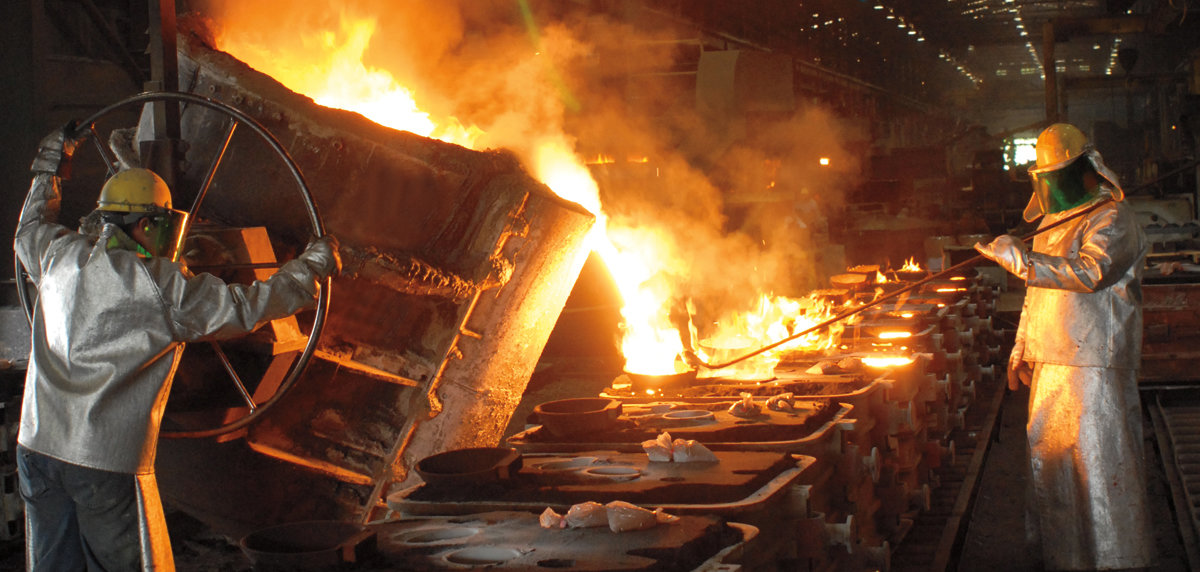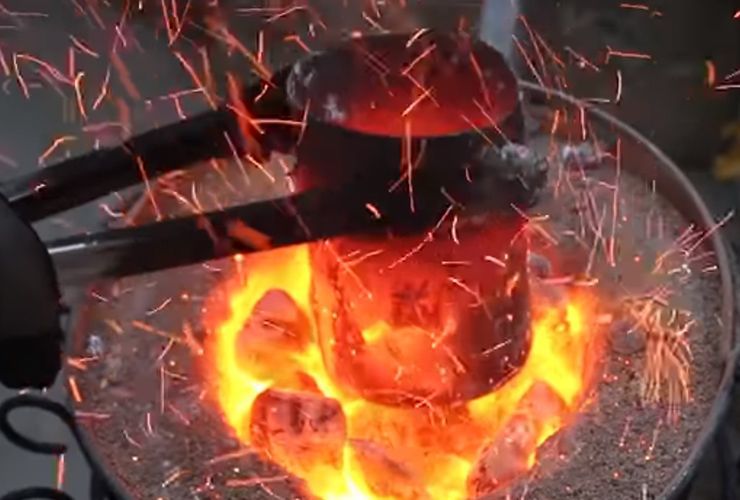Exploring the innovative technologies used in today’s advanced Aluminum Foundry
Wiki Article
A Deep Dive Into Metal Foundries: Key Solutions and Their Influence on Production
Steel foundries are important to modern-day production, supplying important services that form the manufacturing landscape. They focus on different casting procedures, making certain precision and quality in steel components. The evolution of modern technology and sustainable practices has actually better influenced their operations. As sectors significantly rely upon these factories, understanding their key solutions and the effects for production performance comes to be essential. What challenges and developments lie in advance for this essential sector?Recognizing Steel Casting Procedures
Steel casting processes change liquid steel into solid items with different methods, each customized to particular applications and materials. Among one of the most usual techniques are sand casting, investment spreading, and die casting, each offering distinctive benefits. Sand spreading utilizes a mold constructed from sand, enabling the production of huge components at a reasonably low cost. Investment spreading, on the other hand, includes producing a wax pattern that is covered in ceramic, generating intricate and extremely thorough shapes. Pass away casting utilizes high stress to require molten steel into a mold, which is excellent for mass manufacturing of tiny, exact parts. These procedures permit a vast array of steels to be utilized, consisting of steel, aluminum, and bronze, fitting varied commercial requirements. The selection of a proper spreading strategy depends upon aspects such as needed tolerances, manufacturing quantity, and material residential or commercial properties, affecting the total effectiveness and performance of completion products.The Significance of Accuracy Spreading
Precision spreading plays a vital function in producing parts that require high accuracy and elaborate details. This approach, frequently referred to as financial investment spreading, permits limited tolerances and complex geometries, making it vital in markets such as aerospace, automotive, and clinical gadgets. By utilizing wax patterns that are covered with a ceramic covering, accuracy spreading enables the creation of components with smooth surfaces and minimal finishing needs.
Alloy Growth and Product Selection
In the domain of steel factories, alloy development and material selection are essential elements influencing the performance and durability of actors elements. The option of alloy directly affects mechanical buildings, such as toughness, corrosion, and ductility resistance, necessary for meeting particular application needs. Factories commonly participate in substantial research and testing to enhance alloy make-ups, customizing them to the distinct needs of different sectors, including auto, aerospace, and building.Product selection also entails examining factors like price, manufacturability, and availability, ensuring that the selected alloy lines up with production abilities and budget constraints. Advanced simulation devices and logical methods are utilized to predict the habits of various alloys under varying conditions, giving useful understandings for designers. Eventually, reliable alloy growth and material choice allow foundries to generate high-grade parts that enhance operational efficiency and dependability in their intended applications.
Ingenious Molding Techniques
Revolutionizing the production process, cutting-edge molding techniques play a critical function in boosting the performance and high quality of actors parts in metal shops. Strategies such as 3D printing and vacuum cleaner molding have become video game changers, enabling complex styles and minimized preparations. These techniques allow factories to produce mold and mildews with complicated geometries that traditional techniques commonly struggle to achieve.In addition, using sophisticated materials for mold and mildews, such as composite materials, boosts resilience and decreases wear, causing longer manufacturing runs. Quick prototyping additional enables fast models, facilitating quicker development cycles and making it possible for suppliers to respond even more swiftly to market demands.
Automation in molding procedures enhances procedures, lessening human mistake and raising throughput. By integrating these cutting-edge techniques, steel foundries can optimize their production capacities, inevitably leading to better castings and boosted overall performance in the affordable production landscape.
Top Quality Control in Metal Foundries
Quality assurance in metal shops is essential for ensuring the integrity and efficiency of actors products. It incorporates various assessment strategies and criteria, as well as issue detection approaches to recognize prospective concerns early in the manufacturing procedure. Robust quality guarantee processes are vital for keeping uniformity and meeting industry demands.Evaluation Techniques and Specifications
Ensuring the stability of metal castings needs strenuous assessment techniques and adherence to established requirements. Steel foundries carry out numerous evaluation techniques to assess the quality of cast items, consisting of aesthetic inspections, dimensional checks, and non-destructive screening (NDT) These techniques help to recognize possible defects early in the manufacturing procedure. Criteria such as ASTM and ISO give guidelines for appropriate high quality levels and screening treatments, ensuring that foundries preserve consistent top quality throughout their manufacturing lines. Compliance with these criteria not just improves item integrity however additionally promotes depend on among customers. By focusing on assessment techniques, steel factories can minimize dangers associated with flaws and warranty that their spreadings meet consumer requirements and sector requirements.Flaw Discovery Methods
Effective flaw detection techniques are indispensable to maintaining high criteria in metal factories. These approaches incorporate a range of techniques aimed at identifying blemishes in castings before they are processed further. Common methods include aesthetic examination, which counts on the skilled eye of examiners to identify surface flaws, and non-destructive screening (NDT) techniques such as ultrasonic testing and radiography, which disclose interior defects without damaging the product. Furthermore, automated systems employing artificial intelligence and man-made intelligence are significantly made use of to evaluate data and determine abnormalities. Each method plays a vital role in making certain the integrity of the end product, lessening waste, and improving general production efficiency. By applying robust flaw detection procedures, factories can copyright their reputation for quality.Quality Assurance Processes
In steel foundries, a comprehensive quality control process is crucial for producing trusted and high-performing spreadings. This procedure includes numerous phases, consisting of resources evaluation, in-process tracking, and end product evaluation. By executing standard treatments, shops can methodically recognize and rectify flaws before they escalate into pricey concerns. Advanced methods, such as non-destructive testing and metallurgical evaluation, are utilized to examine the stability of castings. In addition, documents and traceability are crucial parts, making certain that each action of manufacturing fulfills rigorous top quality standards. Training employees in quality assurance practices even more improves the performance of these processes. Ultimately, a durable quality assurance framework not only boosts functional performance yet likewise reinforces customer depend on and satisfaction in the foundry's outcome.The Function of Technology in Factory Procedures
Technology reinvents foundry procedures by enhancing performance, accuracy, and safety and security. Automation plays a crucial role, streamlining procedures such as mold making and metal pouring, consequently decreasing labor expenses and lessening human mistake. Advanced computer-aided style (CAD) software application allows specific modeling of elements, helping with quicker changes and versions throughout manufacturing.Furthermore, the integration of robotics in tasks like material handling and completing procedures increases productivity and assurances consistent top quality (Aluminum Casting). Real-time monitoring systems and data analytics give valuable insights into functional efficiency, enabling prompt interventions and upkeep, which eventually lengthens equipment life expectancy

The adoption of 3D printing technology even more allows quick prototyping and tailored options, markedly reducing lead times. Additionally, advanced products innovation boosts the homes of alloys, improving casting performance. To sum up, technical improvements are vital in enhancing foundry procedures, allowing manufacturers to fulfill the raising demands for quality and performance in the affordable metal market.
Environmental Considerations in Metal Casting
Ecological factors to consider in metal spreading play a considerable function in forming sector methods. Efficient waste monitoring, advanced emission control technologies, and the usage of sustainable products are necessary for lowering the environmental impact of factories. Resolving these elements is vital for advertising a much more sustainable future in steel production.
Waste Administration Practices
Efficient waste monitoring techniques are essential in the metal spreading sector to reduce environmental influences. Metal Foundry. Shops create different kinds of waste, consisting of steel chemical, sand, and scrap deposits. Executing recycling programs enables the repurposing of steel scrap, minimizing the requirement for virgin materials and minimizing landfill payments. Furthermore, foundries often utilize sand improvement processes, which reuse and recuperate sand multiple times, thereby reducing waste generation. Appropriate disposal approaches for harmful materials, such as binding representatives and solvents, are crucial to avoid dirt and water contamination. Staff member training on waste partition and reduction techniques can boost overall effectiveness and sustainability. Via these methods, metal shops can considerably minimize their eco-friendly footprint while preserving manufacturing effectivenessDischarge Control Technologies
As the metal casting sector evolves, the execution of innovative discharge control technologies comes to be increasingly vital for reducing unsafe toxins released throughout production procedures. These modern technologies include numerous approaches, including electrostatic precipitators, scrubbers, and catalytic converters, which effectively capture and counteract discharges before they enter the environment. By integrating such systems, foundries can markedly reduce particulate issue, volatile natural substances, and various other dangerous exhausts. Additionally, compliance with strict ecological guidelines not just reduces eco-friendly influence but likewise enhances the industry's online reputation and functional effectiveness. The adoption of these innovations shows a commitment to sustainable practices, making sure that metal spreading procedures can satisfy the growing need while focusing on ecological health and wellness and safety and security.Lasting Products Usage
Sustainable products use in metal spreading plays a crucial role in reducing the industry's eco-friendly impact. Shops are significantly embracing recycled steels, which greatly reduce the need for virgin sources and lower power usage throughout the manufacturing procedure. Furthermore, the use of environment-friendly binders and additives boosts the sustainability of casting procedures by minimizing damaging discharges and waste. Innovations in product scientific research additionally enable for the growth of eco-friendly choices that do not jeopardize item high quality. Furthermore, shops are applying life-cycle evaluations to evaluate the environmental influence of products throughout their life expectancy, promoting even more responsible sourcing and use. Overall, these practices add to an extra environmentally conscious and sustainable metal casting industry, aligning with international initiatives to minimize carbon footprints.Regularly Asked Questions
What Are the Main Kind Of Metal Used in Shops?
Factories largely make use of steels such as iron, light weight aluminum, magnesium, and copper. These materials are picked for their special homes, which affect the spreading procedure and the efficiency characteristics of the final items manufactured.How Do Shops Guarantee Worker Security Throughout Operations?
Factories ensure employee safety and Metal Casting security through extensive training, appropriate equipment, air flow systems, and adherence to security policies. Regular inspections, personal protective equipment, and emergency situation methods further improve a secure workplace for staff members participated in steel manufacturing.What Is the Common Preparation for Casting Production?
The regular preparation for casting manufacturing varies, normally varying from a couple of weeks to a number of months. Factors influencing this timeline include complexity of the layout, material schedule, and the foundry's manufacturing capacity and organizing.How Do Foundries Take Care Of Waste and Recycling Processes?
Factories handle waste and recycling by carrying out procedures such as steel recovery, sand recycling, and proper disposal of unsafe products, consequently decreasing environmental effect and promoting sustainability in their procedures while sticking to governing requirements.What Industries The Majority Of Frequently Use Metal Foundry Providers?
Metal shop solutions are mainly made use of in sectors such as auto, equipment, building and construction, and aerospace production. These sectors count on foundries for creating actors metal parts necessary for numerous applications and item growth.Steel factories are important to contemporary manufacturing, offering vital solutions that form the production landscape. Metal spreading processes transform liquid metal right into solid items with numerous strategies, each customized to particular applications and materials. As technology advances, the significance of precision spreading proceeds to expand, driving innovation and performance in steel foundry operations. Revolutionizing the manufacturing procedure, innovative molding techniques play an essential duty in boosting the effectiveness and high quality of cast parts in steel foundries. In steel shops, a comprehensive quality assurance procedure is vital for creating trustworthy and high-performing castings.
Report this wiki page